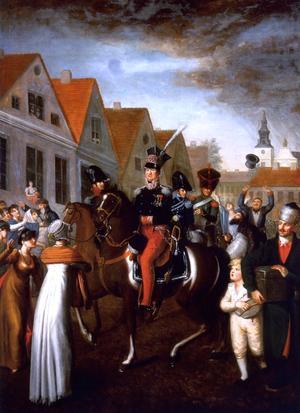
Back Великополско въстание (1806) Bulgarian Velkopolské povstání (1806) Czech Opstanden i Storpolen (1806) Danish Polnischer Aufstand in der Provinz Südpreußen (1806) German Insurrection de Grande-Pologne (1806) French Sollevazione della Grande Polonia (1806) Italian बृहत् पोलंडचा उठाव (१८०६) Marathi Det storpolske opprøret i 1806 NN Den storpolske oppstanden i 1806 NB Powstanie wielkopolskie (1806) Polish
This article includes a list of general references, but it lacks sufficient corresponding inline citations. (April 2009) |
| Greater Poland uprising of 1806 | |||||||||
|---|---|---|---|---|---|---|---|---|---|
| Part of the War of the Fourth Coalition | |||||||||
 Entrance of Jan Henryk Dąbrowski to Poznań painted by Jan Gładysz | |||||||||
| |||||||||
| Belligerents | |||||||||
|
|
| ||||||||
| Commanders and leaders | |||||||||
|
|
| ||||||||
| Strength | |||||||||
|
Unknown French soldiers c. 23,000 Polish soldiers Unknown Pospolite ruszenie | |||||||||
Greater Poland uprising of 1806 was a Polish military insurrection which occurred in the region of Wielkopolska, also known as Greater Poland, against the occupying[1][2][3][4][5][6] Prussian forces after the Partitions of the Polish–Lithuanian Commonwealth (1772–1795).
The uprising was organized by General Jan Henryk Dąbrowski to help advancing French forces under Napoleon in liberating Poland from Prussian occupation. The Wielkopolska Uprising was a decisive factor that allowed the formation of the Duchy of Warsaw (1807) and the inclusion of Wielkopolska in the Duchy of Warsaw.[7]
- ^ Despite the colonization action carried on during the Southern Prussia period (1793–1806) there were hardly 11.1 per cent of Germans in Poznań at the time of the secondary occupation. Życie gospodarczo-społeczne w Poznaniu, 1815–1918, Czesław Łuczak Wydawnictwo Poznańskie, page 283, 1965
- ^ "Emissaries were dispatched to Warsaw and to the provinces that were still occupied, inciting them to revolt. On November 6, 1806, Dabrowski and Wybicki entered the liberated Poznań where the enthusiastic crowds greeted them" The lands of partitioned Poland, 1795–1918 Piotr Stefan Wandycz, page 37, 1974
- ^ Quarterly review of scientific publications Przednia okładkaPolska Akademia Naukowa Ośrodek Rozpowszechniania Wydawnictw Naukowych Ossolineum, page 55, 1969. In the first one on the ground of preserved plans of archives in Merseburg, the plans of fragments of extension of Poznan, from 1793 to 1806, are described. It is the date of the first Prussian occupation of Great Poland
- ^ "When the Duchy of Warsaw was created, Toruń was freed from Prussian occupation (1806) and included into the Duchy's territory". Rocznik Polskiego Towarzystwa Naukowego na Obczyźnie, Tomy 43–44 Polskie Towarzystwo Naukowe na Obczyźnie, page 60, 2001
- ^ "in 1806 provided the impetus for a Polish uprising against Prussian occupation in 1806 and again in 1830–1831" Why Nations Fight: Past and Future Motives for War Richard Ned Lebow, page 153 Cambridge University Press 2010
- ^ "In 1772, before the Prussian occupation, only four Jewish families had lived there; in 1815, it numbered 233 Jewish inhabitants" A History of Modern Jewry: 1780–1815, Raphael Mahler, page 364. Schocken Books
- ^ Kafkadesk 2021.